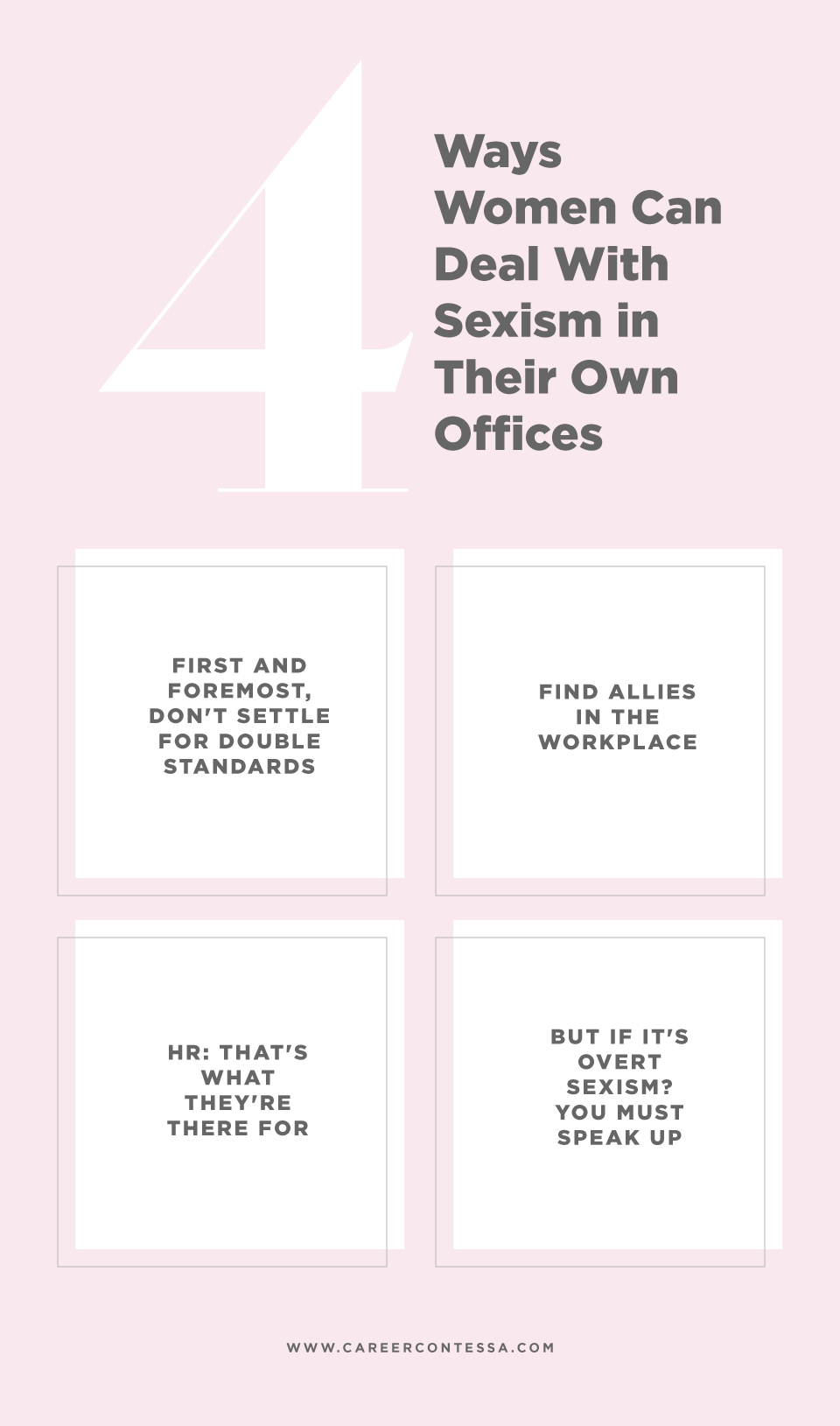We were recently asked a completely legitimate, complex, and essential question: "How do I deal with sexism in the workplace?"
One of those questions makes you go, "Ooh."
But then we immediately realized we didn't have a great answer, because sexism comes on all shapes and sizes—and clever disguises, too.
We've all been in those terrible hours-long sexual harassment training courses. So it's old news: sexual harassment = wholly unacceptable. But
sexism in the workplace is (maybe unfairly and
definitely unfortunately) more of a gray zone: less "unacceptable," more "uncool." And gray zones are hard.
Since we're a women's career advice site, it's a topic we should have covered in detail—so we decided to take it on, one sexist instance at a time.
Table of Contents
What is Workplace Sexism?
This is probably the main reason we've subconsciously avoided the topic so far. To face a problem, you have to know what that problem is. And defining workplace sexism is pretty difficult.
We'll start by splitting the term in two:
Overt Sexism
This is the more serious form of sexism. It's the sexism that makes the headlines. Overt sexism is easily identified because it's so in your face.
Overt sexism is the stuff we all talk about so often, we've started to make those sexual harassment videos the butt of our jokes. That's not to say we don't take it seriously. Unwanted sexual advances or harassment, we know, cause harm to our well-being and sense of place in the office—which is why overt behavior is commonly assumed to be the most damaging type of sexism.
"Casual" Sexism
That brings us to casual sexism, where things get more interesting.
Casual sexism could also be called latent sexism—it's so ingrained in company culture that it often passes by unnoticed. Maybe
you don't even notice it's happening to you, but just experience a subtle feeling of alienation or even
impostor syndrome. Think: "harmless" sexist jokes, "
mansplaining," or even those times when your boss treats your male colleagues marginally differently than you. You can read more about the nuances of casual sexism
here.
But for Women in the Workplace? The Difference Doesn't Actually Matter
You might have noticed we used the term "assumed" in my definition of overt sexism as in it's commonly
assumed this sexism is most damaging. That's because a
recent study found that casual sexism produces just as much of a negative impact, maybe more. That means that we need, desperately, to challenge even the most latent behaviors, literally, for our health.
4 Ways Women Can Deal With Sexism in Their Own Offices
1. First and Foremost, Don't Settle for Double Standards
That is to say, if your boss calls all your male coworkers by their last names but calls you by your first (or God forbid, "Toots"), speak up. Ask why. It can feel scary, but often, the double standards are so ingrained that people don't realize they're enabling them. Asking why brings perspective into the situation, forcing the offender to consider their actions publicly. In fact,
Bustle suggests that you might want to "ask that person if he or she would have done or said the same thing if you were a man."
By calling him or her out (in a clear, but non-abrasive way), you bring light to the issue and force them to assess their own behavior. Sometimes, sexism really is just someone being insensitive. Still not cool, but speaking up will solve that issue. And if it doesn't? We'll be real with you: speaking up now means that you've created a paper trail of sorts, so that you can lodge a formal complaint later if necessary.
By the way, all this also means that if you happen to be a manager or in a position of seniority, you should confront sexist behavior even if it's not targeted at you. Speak up for other women just as you would want them to speak up for you. Again, office sexism is cultural, so you've got to address it as such—one bad joke or inappropriate comment affects the entire team dynamic and your employees' morale.
2. Find Allies in the Workplace
If other women are in the office, speak to them about their experiences. How are they feeling? Resigned? Alienated? If it's clear that there's a deeper issue with company culture, it's worth bringing up to your HR department.
Even if your experiences differ, it helps to discuss things with coworkers, especially if they've had more experience in the industry or have been working at the company longer. It puts things in perspective.
Speaking to other women also means you'll have someone more objective to consider your problems—it's easy to feel like you're being overly sensitive when you're one woman facing a fraternity-style workplace.
But the concept of allyship goes much further than simply comparing and sharing experiences. The most crucial element is to build power in numbers. A true ally will join you when you protest.
Picture this scenario. You've probably seen this at one point or another:
- One person speaks up after being offended by a comment.
- An awkward pause ensues.
- Then others begin to speak up, saying things like, "Yeah, that was uncalled for," "She's right, that makes me uncomfortable, too," etc.
Hopefully, this is done as constructive criticism, but sometimes people are jerks. In these cases, pull the bandage off. The quickest way to stop them from repeating the behavior is to call them out for it publicly.
3. HR: That's What They're There For
HR doesn't need to be a last resort. In fact, they're there for advice, so consult them.
It doesn't hurt to bring these items up in meetings with your boss, especially during an annual or performance review, if it's a long-term overarching issue in the work environment. It helps to present a possible solution when you bring up such a touchy problem. If you feel like women aren't getting adequate representation in your office, suggest organizing a women's panel/organization that meets monthly (companies like Nike have instated these to encourage diversity and open dialogue) or that your company implements a training or mentorship program for women to combat the inequality and improve office culture.
4. But If It's Overt Sexism? You Must Speak Up
Let's be clear: sexism in the workplace is unacceptable. It's one thing for your coworkers to fail to invite you to lunch (again see point #1: ask why). But if you're being sexually harassed or feel uncomfortable at your work? Do not pass go—head straight to HR.
Can Sexist Colleagues Retaliate?
It's real, unfortunately.
Especially if your office has a "good old boys" mentality, being the one to speak up will cause some friction. It's not all flowers and sunrises, but in case you haven't caught on, we still think it's worth it.
If you're truly concerned about retaliation, though, there are ways to preserve your anonymity. A private conversation with HR. Even submitting an anonymous report. We don't recommend this approach, though, unless it's your only choice. Part of the issue with workplace sexism is that it goes unconfronted. An anonymous note doesn't exactly expose it publicly.
How to Handle a Sexist Boss
We hope you don't have one, but if you do, it's a different situation than general office sexism. Again, overt versus casual harassment comes into play here. If your boss is overtly harassing you, the easy answer is to complain to HR or a supervisor above your manager. But if it's casual? That's where it gets tricky.
1. Point It Out (But Don't Condemn)
Per our earlier note, don't settle for double standards. There are ways to question your boss's behavior without antagonizing him (or her). Yet again, we'd suggest you start by asking why—without losing your cool.
Let's leave sexism aside for a moment and consider bias in general. You've probably witnessed a moment when a good friend, your partner, your parent, or whoever said something that was a bit off-color. We'd be willing to bet you've said something before that wasn't exactly politically correct.
So, let's assume your boss isn't aware of his gaffe. Making space for women may require a major cultural shift, especially in male-dominated workplaces. If your cubicles were just a boys' club up until the last few years, your boss's sexism might not be intentional at all—it could just be ingrained from years spent in a dated company culture.
But that doesn't mean it should stand, and that's where the "asking why" bit comes in. Call attention to the behavior and see what your boss's response is. Then, if necessary, explain why you feel it could "be perceived" as inappropriate (we'd skip the more daring confrontations here due to the obvious power dynamic). Chances are, he'll recant.
2. If The Problem Continues, Play Hardball
After that initial educational round of dialogue, if your boss still doesn't get your issue, it's time to make it personal. Explain that it makes you uncomfortable in the office environment and that you'd like it to stop.
And if the problem continues after you've voiced your concerns? That's when casual crosses the line into overt sexism—because your boss knows you're uncomfortable and continues his behavior anyway—and that's when you talk to HR or another supervisor.
How to Handle A Sexist Client
And then, of course, there are the gray zones of gray zones. We've covered how to deal with sexism if it's internal, but what about if the offender is a contractor or client? After one of our Instagram followers asked us a follow-up about it, we did some more research. Turns out we're not the only people wondering. In fact, there's a whole Reddit for
that. But basically, we'd say this: you have a choice depending on context.
If This is a One-time, Short-term Client
If it leaves a gross taste in your mouth, but you feel it isn't worth the confrontation, finish the project and don't work with them again. If you feel compelled to speak up but aren't sure how, we suggest you start by asking them to just repeat what they said. It forces them to pause and consider. If that doesn't work, move on to asking why (sensing a pattern here?).
If This is a Repeat Client, and You're Their Sole Point of Contact
Now's the point where you decide whether to confront them about the behavior. You've probably heard that adage about working with a client being like a relationship. An overtly sexist client? Worth dumping just as much as a shitty boyfriend, regardless of shared finances.
If This is a Client at Your Firm or Company
If this is a larger project you're assigned to, and you just aren't sure about the politics of confrontation, consult your boss. He or she can decide how to proceed (and if you're truly uncomfortable, don't hesitate to ask for a reassignment).












